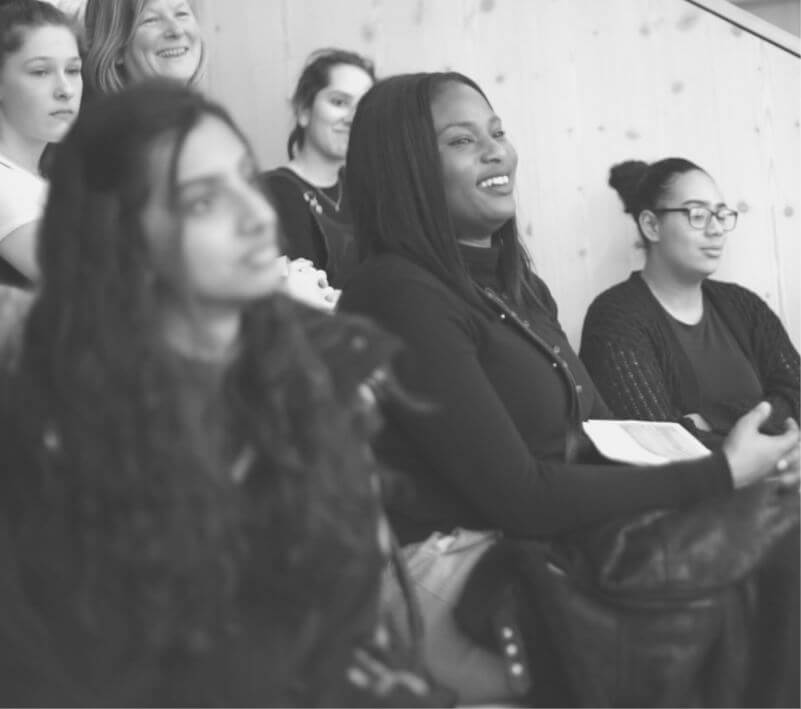Why aren’t young women applying for STEM apprenticeships
Tuesday 11th Jun 2019

After three months of mentoring and a celebratory event, Pathway CTM shares their learnings around female students and STEM apprenticeships.
Najma Hassan & Scarlett Stock
In recent years efforts have been made to address the gender gap within the STEM field. There are several reasons as to why young women are less likely to pursue a career within STEM, one is the gendered nature of STEM-based subjects. Leprince-Ringuet’s 2019 article explains that subjects such as computer science and physics are viewed as something that men do, as opposed to women. These stereotypes become an inhibitor for young women choosing these subjects and this career path.
This year we, at Pathway CTM, piloted a Female into STEM mentoring programme and event which was aimed at encouraging young women to pursue apprenticeships within the STEM field at top companies such as EY, Transport for London and Accenture. From this event and mentoring we learned that continuous support and positive female role models within the field are key to challenging these stereotypes. At our event one young woman pointed out the stereotypes attached to STEM subjects do “affect the confidence of young women”. This sentiment is backed up by research which shows that the socialisation of boys and girls does influence their subject choices . Certain apprenticeship programmes require subjects such as computer science or maths A-Level – which can prohibit young women from entering this field. However, more employers are looking beyond STEM subjects at A-Level and are taking on apprentices without specifying what subjects they have had to study, which is making the field even more accessible!
However, British science journalist Angela Saini says that the disparity in the number of women entering the field is no surprise, even though both girls and boys do perform at about the same level at school. She notes that young women not pursuing a career within STEM is a strategic choice since entering a male dominated field is perceived by girls and women as coming with more of a “challenge”.

This idea is further supported by research which shows that girls are only confident in applying for a job if they can do 100% of the job specification, whereas men apply even if they are able to perform as little as 60%. Through our STEM Initiative we found that talking to young women about their extra-curricular activities and helping them to link these experiences explicitly to the skills required for the workplace helped to boost confidence.
When we at Pathway were mentoring the young women many would struggle with the question “what skills and experiences make you suitable for this role?” They almost discounted their impressive extracurricular experiences – like being an antibullying ambassador, or a school prefect. They would feel that because they hadn’t been a data analyst or software engineer before, they did not have the prerequisite skills – but their transferable skills make them suitable for the apprentice position. Therefore, speaking to young women about the impressive skills they possess and normalising and celebrating these skills is key when it comes to cultivating confidence.
Saini notes that “When you are underrepresented it does put the spotlight on you, and people expect more from you.” She goes on to say that she can understands why girls choose not to go into STEM. “It’s not nice. I still chose to do it, but I can understand why other girls didn’t make that choice.” This highlights that the lack of female representation within the STEM field holds girls back from taking the leap. At our event (celebrating the mentoring work that had spanned three months, with sixty students) we hosted female apprentices and recruiters from top companies and students noted how they were able to “see themselves in the role” a lot more. Hearing female apprentice’s stories created a powerful sense of inspiration for the young women we worked with.
So, how can this be rectified? According to the young women at our event positive female role models who do STEM job is key, with one attendee saying that she didn’t see herself in a STEM apprenticeship because “there weren’t any people who looked like me”. This paired with the fact that women account for less than 24% of the STEM work force in the UK , suggests that having more inclusive media representation within the STEM field is truly necessary. Further, encouraging women to be proud of their skills and achievements, and take leaps toward jobs where they don’t fit 100% of the job specification is important to ensure that more young women apply to roles. Our findings showed that 80.4% of the girls found that a female-only STEM focused event was useful in alleviating some of the anxiety they had in taking a step towards pursuing a career within STEM. This suggests that more events and mentoring programmes would benefit young women when pursuing a career in STEM.
It’s clear that the reasons for young women not choosing to embark on career within STEM are multifaceted, but ultimately to do with confidence. What our project illustrated, alongside wider research, is that currently much more support, encouragement and representation to remedy these confidence issues and eventually achieve a more representative, diverse workforce.
References:
1) Leprince-Ringuet, D. (2019). Talent isn’t keeping women away from science. Sexism, stereotypes and bad science are. [online] Wired.co.uk. Available at: https://www.wired.co.uk/article/girls-women-stemgcse-a-levels.
2) van der Vleuten, M., Jaspers, E., Maas, I. and van der Lippe, T. (2016). Boys’ and girls’ educational choices in secondary education. The role of gender ideology. Educational Studies, 42(2), pp.181-200.
3) Ferguson, D. (2019). The book that fights sexism with science. [online] the Guardian. Available at: https://www.theguardian.com/science/2018/aug/1 1/women-equal-to-men-science-fact-book-angelasaini.
4) Sophia Mohr, T. (2014). Why Women Don’t Apply for Jobs Unless They’re 100% Qualified. [online] Harvard Business Review. Available at: https://hbr.org/2014/08/why-women-dont-applyfor-jobs-unless-theyre-100-qualified.
5) Welcome to the WISE Campaign. (2017). Women in STEM workforce 2017 – Welcome to the WISE Campaign. [online] Available at: https://www.wisecampaign.org.uk/statistics/wome n-in-stem-workforce-2017/




